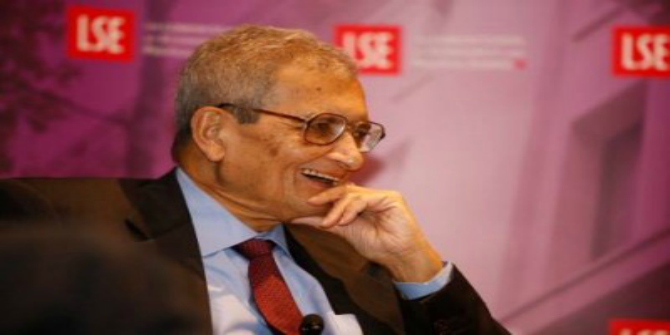 In this book Malcolm Torry considers the social, economic and labour market advantages of introducing a Citizen’s Income in the UK. The author attempts to explore its implications on the economy, social cohesion, families, and the employment market. Though the ideal of a Citizen’s Income, with all its strengths and weaknesses, is a challenging framework to reflect on, the author shows how to make it a reality, writes Aurelie Charles.
In this book Malcolm Torry considers the social, economic and labour market advantages of introducing a Citizen’s Income in the UK. The author attempts to explore its implications on the economy, social cohesion, families, and the employment market. Though the ideal of a Citizen’s Income, with all its strengths and weaknesses, is a challenging framework to reflect on, the author shows how to make it a reality, writes Aurelie Charles.
 Money For Everyone: Why we need a Citizen’s Income. Malcolm Torry. Policy Press. June 2013.
Money For Everyone: Why we need a Citizen’s Income. Malcolm Torry. Policy Press. June 2013.
Malcolm Torry proposes in his book a convincing argument in favour of a universal basic income, or Citizen’s Income, defined as an “unconditional income paid by the state to every man, woman and child as a right of citizenship”. His argument is based on the premise that, in an ideal country, one should be entitled to a basic income in order to achieve basic living standards for all. Interestingly, this ideal setting is imagined to be UK-based, a sovereign state where citizens are also subjects, and the argument is then extended to its potential application to the UK system.
Torry starts by analysing the reasons behind the need to provide basic living standards in modern societies. There is indeed a need to tackle the failures of market mechanisms to allocate equitably the fruits of economic growth. If achieving positive economic growth is about how to increase efficiently the size of the cake, a basic income is about increasing the size of the shares of the entire population, including the most deprived groups. “Let them eat cake” would one have suggested… but history taught us here that misunderstanding the needs of one’s subjects in terms of having access to a fair share of the cake rather than having actual access to the cake can lead to a considerably shortened end…but this is for another ideal country setting.
Chapter 14 focuses on how to fund a Citizen’s Income. Indeed, at a time of tightening in government budgets, the project of finding sources of funding for a Citizen’s Income may sound rather provocative. However, the reader will certainly appreciate the honesty with which the author is always careful in providing accurate solutions without undermining the potential limitations of his current framework. A first source of funding could, for example, come from the existing income tax and benefits structure, in which case the funding is based on the reallocation of taxes and benefits within the existing system, rather than from raising additional tax revenue. A second source of funding could come from taxing common resources and to try in particular to “tax things that do not reduce in quantity if taxed”, such as land. In a globalised system, this may however lead to the flight of capital outside the national boundaries. As put forward by the author, the bottom line here is that, as long as there is a political will to set a Citizen’s Income, then finding the ‘right’ sources of funding will follow. Finding the right sources in itself is a rather political process since it involves conflicting political interests to assess what group(s) will financially lose or win out of this resource reallocation.

Once it becomes politically acceptable to fund a Citizen’s income, the next question to be raised is who should receive it (Chapter 12)? The concepts of citizenship and of Citizen’s Income itself are based on the values of universality, equality, and participation. The way the universality of citizenship is defined here is that “anyone on the electoral register will receive a Citizen’s Income”, a reasonable justification being that legislation for a Citizen’s Income would need voter support. From a utilitarian perspective, a consequence of a universal windfall in income is an overall increase in social welfare with everyone benefiting without anyone being worst off; this is called a Pareto improvement. The purpose of such windfall of income is to raise the threshold of minimum living standards. However, a potential negative impact would be the inflationary pressures that this increase will engender. In effect, a general rise in income, regardless of its source, mean that more money ready to be spent is in circulation in the economy and this could lead to a rise in the general level of prices. If so, the initial rise in income will be offset by the loss of purchasing power, which is crucial when understanding the needs of the poor. The intention of raising minimum standards of living can therefore be undermined by its inflationary outcome.
In return for a Citizen’s Income, the author argues that participation will be promoted whereby people would be encourage to take on employment “and particularly self- and part-time employment, to fulfil their obligations to their families and to their community” (p.203). Citizenship therefore comprises “obligations to contribute to society by paid work or unpaid work and this could mean less paid employment and more unpaid employment”. The argument here is based on a concept of work understood as a ‘beneficial activity’, and that it can be beneficial for the individual, the social groups to whom he or she belongs, or the society as a whole. The time horizon is also important to understand to whom it can be beneficial. A beneficial activity can represent an immediate improvement in social welfare, or from a long-run perspective it can represent the benefits of future generations or the sustainability of society as a whole. The boundaries of participation, if any, would certainly need to be defined to lower the risk of free-riding behaviour.
Finally, let us imagine that we are now living in a country where Citizen’s Income has become the norm. It has become socially accepted and everyone expects to receive it. The law of diminishing returns would predict that the sense of participation of everyone actively participating to the common good of society will tend to diminish over time, unless additional incentives are provided to keep the momentum going. Similarly, if unpaid employment becomes the norm, the overall level of output will fall over time and so the ability to finance a Citizen’s Income. The ideal of a Citizen’s Income is a challenging framework to reflect on. But with all its strengths and weaknesses, all governments from all ideological perspectives should seriously consider it, and Malcolm Torry certainly shows how to make it a reality.
———————————————————
Aurelie Charles is lecturer in Global Political Economy at the University of Bath, Centre for Development Studies. She is Associate Editor of the Review of Social Economy and her research interests relate to the measurement of social norms and their effect on individual decision-making and human interactions. Read more reviews by Aurelie.








2 Comments